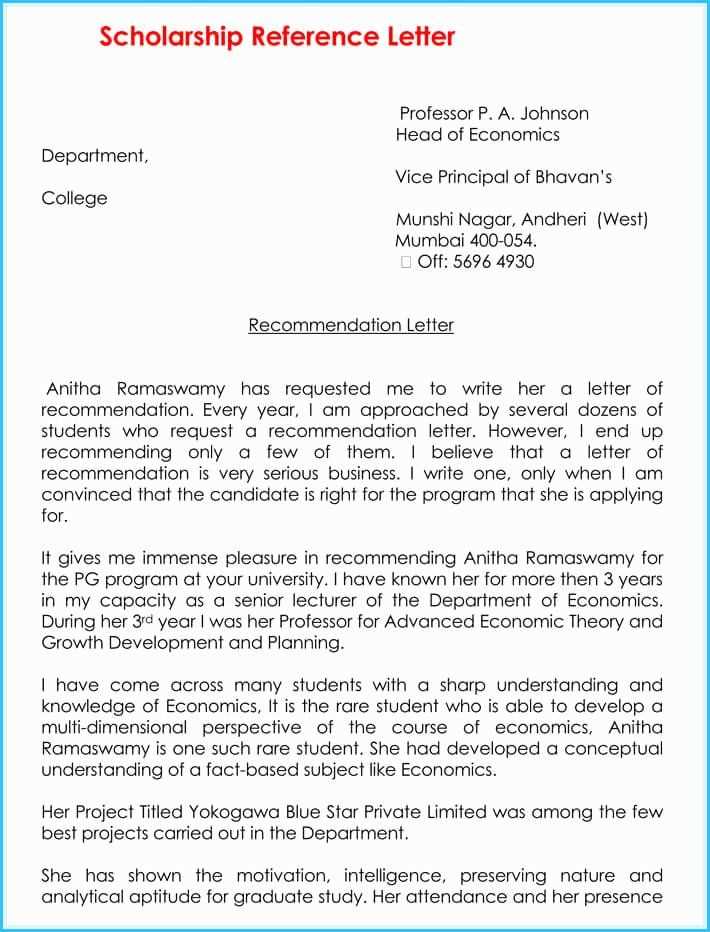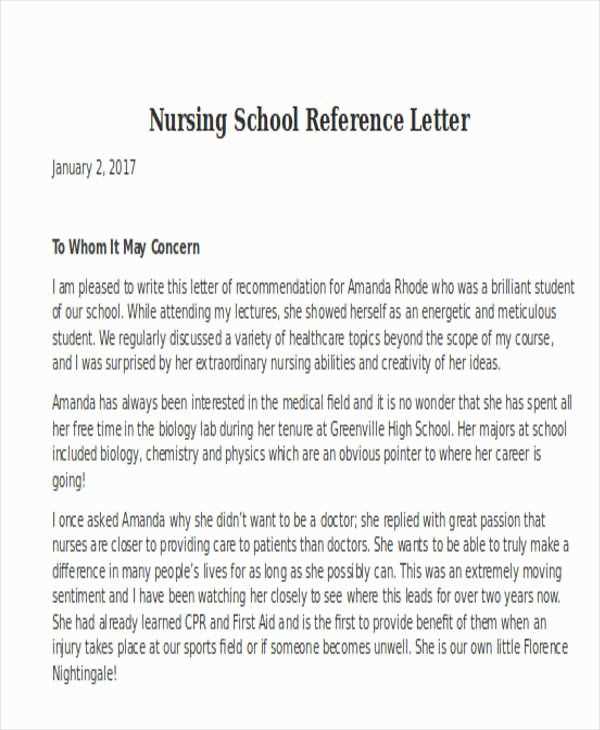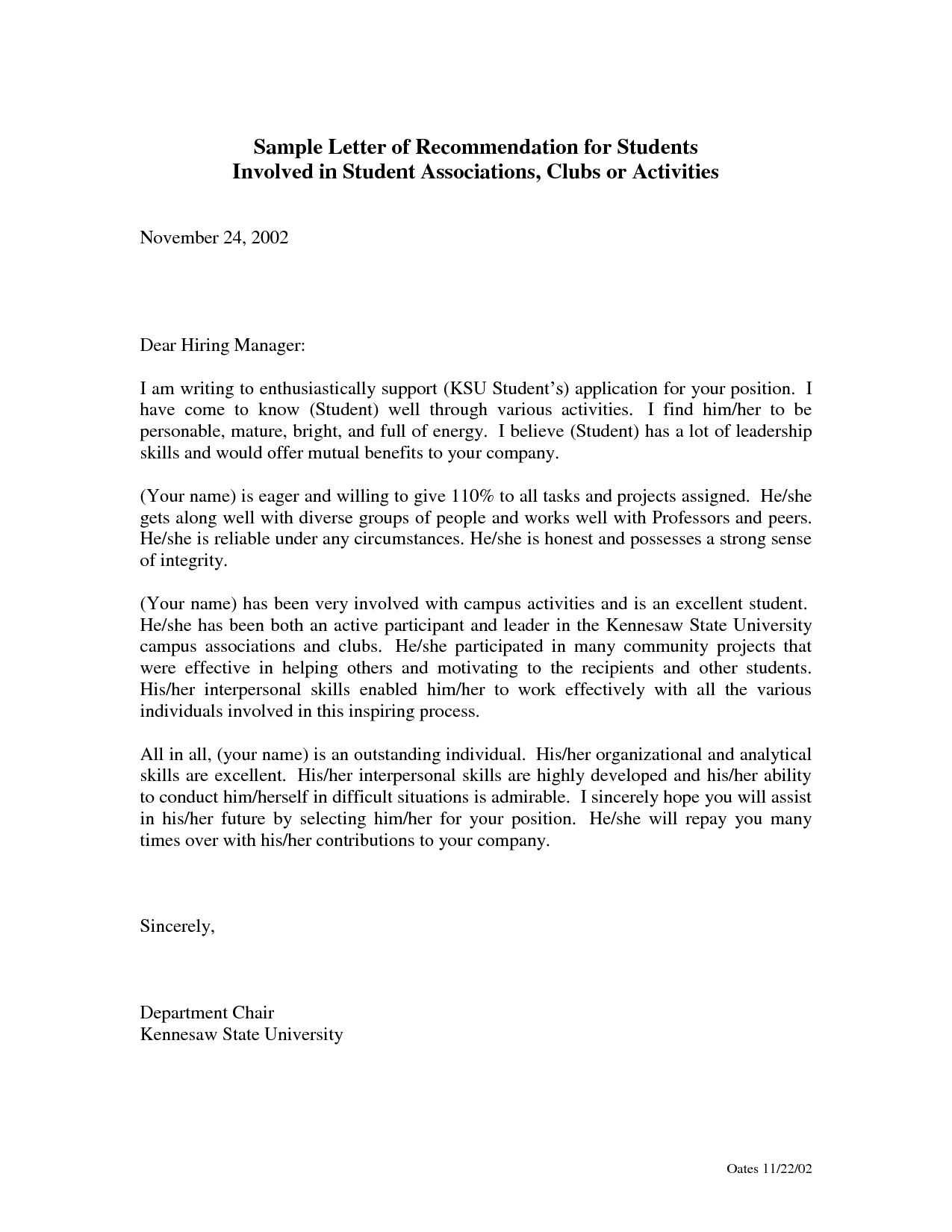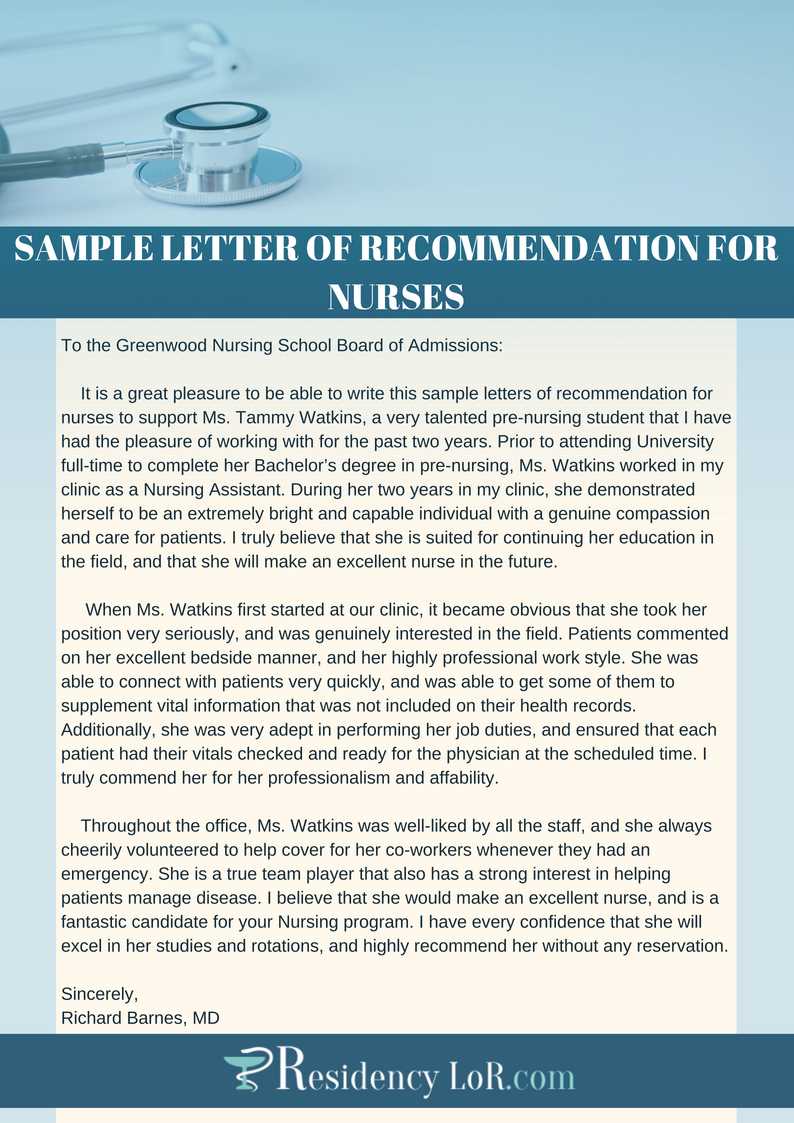Nursing student letter of recommendation template

If you’re asked to write a letter of recommendation for a nursing student, begin by clearly stating your relationship to the student. Mention how long you’ve known them and in what capacity, highlighting specific interactions or experiences that give weight to your recommendation.
Focus on the student’s strengths, such as their dedication, compassion, and communication skills. Include specific examples of their ability to handle clinical challenges, their interactions with patients, and how they work with peers and supervisors. For instance, you might mention a time when they took initiative in a difficult situation or demonstrated exceptional critical thinking skills during patient care.
End the letter with a strong, positive endorsement. Reinforce why you believe the student would excel in their nursing career and how they stand out from their peers. Be clear and concise, ensuring your recommendation comes across as sincere and confident.
Detailed Guide for Nursing Student Letter of Recommendation
A strong letter of recommendation for a nursing student highlights their clinical skills, academic performance, and personal qualities. Focus on specific instances where the student demonstrated critical thinking, compassion, and teamwork. Highlight their capacity to handle challenging situations and their ability to provide compassionate care to patients.
Start by mentioning the context in which you know the student. State the duration of your professional relationship and the setting–whether clinical, academic, or extracurricular. This helps establish credibility for your assessment.
Describe the student’s technical abilities, such as their competence in conducting patient assessments, administering medications, and using medical equipment. Mention specific examples where the student excelled in these tasks. Acknowledge their ability to adapt to new environments and handle various clinical scenarios with confidence.
Address the student’s communication skills. Nursing requires clear communication with patients, families, and healthcare teams. Include examples where the student effectively communicated complex information or provided emotional support to patients. Emphasize their ability to listen actively and convey information in an empathetic, professional manner.
Don’t forget to include the student’s interpersonal skills. Nurses work in team settings, and it’s important to highlight how well the student collaborates with others. Mention their ability to take direction and offer assistance to colleagues when needed. Give examples of how they maintained a positive working relationship with peers, mentors, and supervisors.
Finally, conclude by discussing the student’s potential as a future nurse. State with confidence why you believe they will excel in the field. This could be based on their dedication to improving their skills, their passion for nursing, or their commitment to patient care.
Understanding the Purpose of a Recommendation Letter
A recommendation letter provides insight into a nursing student’s abilities, work ethic, and potential for success in a healthcare environment. It acts as a personal endorsement, offering a perspective beyond grades or test scores. A well-written letter highlights key qualities such as empathy, attention to detail, and critical thinking skills, which are essential for nursing professionals.
What Makes a Strong Recommendation?

- Specific Examples: Recommenders should reference real-life instances where the student demonstrated strong clinical skills, teamwork, or leadership.
- Personal Insight: The letter should reflect the recommender’s genuine experiences with the student, showcasing their character and potential in a healthcare setting.
- Direct Connection: The letter should tie the student’s qualifications to the specific role they are applying for, whether it’s a nursing school or job opportunity.
The Impact of a Well-Written Letter
A well-crafted letter strengthens the student’s application by providing tangible proof of their competence and dedication. Recommenders should focus on the student’s ability to handle the demands of nursing, such as managing stressful situations, providing compassionate patient care, and communicating effectively with a team. This personalized recommendation can often be the deciding factor in an admissions decision or job offer.
Key Components to Include in the Letter
The letter of recommendation should highlight the student’s specific strengths and skills relevant to nursing. Focus on their academic performance, clinical skills, work ethic, and ability to interact with patients and healthcare teams.
Academic Performance
Provide examples of the student’s academic achievements, such as high grades in core nursing courses, research projects, or relevant certifications. Mention how the student demonstrated strong analytical skills and critical thinking in challenging coursework.
Clinical Experience and Skills
Discuss the student’s hands-on experience in clinical settings. Describe how they performed key tasks such as patient assessments, administering medications, or working under pressure. Emphasize their ability to handle patient care competently and with empathy.
Be specific about the student’s strengths in teamwork and communication, as these are crucial in nursing practice. Mention any instances where the student effectively collaborated with multidisciplinary teams or communicated complex information to patients and their families.
How to Describe the Student’s Clinical Skills
Focus on specific examples that show how the student applies theoretical knowledge in practical settings. Describe their ability to assess patient needs, make informed decisions, and perform procedures with precision. Highlight their proficiency in using medical tools and technologies, ensuring accurate diagnoses and effective treatments. Mention how they handle complex cases, working independently and in teams.
Observation and Assessment Skills

Point out the student’s attention to detail during patient assessments. Explain how they gather relevant information, perform thorough examinations, and interpret data to guide clinical decisions. If they’ve handled challenging or uncommon cases, include those instances to demonstrate their ability to apply knowledge under pressure.
Communication and Teamwork
Highlight how the student communicates with patients and colleagues. Emphasize their ability to explain medical information in clear terms, provide emotional support, and work seamlessly with healthcare teams. Describe their contribution to collaborative efforts, especially in high-stakes situations where effective teamwork is crucial to patient outcomes.
Highlighting the Student’s Academic Achievements

During the time she has spent in the nursing program, Sarah has consistently demonstrated exceptional academic performance. Her ability to grasp complex concepts quickly and apply them effectively in practical scenarios sets her apart from her peers. She regularly ranks in the top 10% of her class, maintaining an impressive GPA that reflects her dedication and strong work ethic.
Outstanding Performance in Clinical Assessments
Sarah excels in clinical assessments, consistently outperforming expectations. Her clinical evaluations showcase her precision, critical thinking, and ability to make informed decisions under pressure. Her supervisors have commended her for her ability to provide patient care with the highest level of professionalism, ensuring that her knowledge and skills are evident in every task she undertakes.
Exceptional Research and Analytical Skills
In her research projects, Sarah stands out for her thoroughness and analytical approach. She has completed multiple assignments where her ability to analyze data, synthesize information, and present findings in a clear and organized manner has been praised. Her research papers are always well-researched and meticulously written, showcasing her depth of understanding in nursing practice and theory.
Writing About Personal Qualities and Professionalism
Focus on highlighting the nursing student’s key attributes that demonstrate both their personal character and their approach to the healthcare profession. Choose specific qualities that stand out, like empathy, attention to detail, or strong communication skills. Support each attribute with examples that showcase how these traits were applied in real situations.
For example, if the student is known for their compassion, describe a time when they provided exceptional care or supported a patient in a challenging situation. If they exhibit excellent teamwork, point out how they collaborated effectively with peers, contributed to group efforts, or helped resolve a conflict.
When addressing professionalism, be clear about how the student adheres to high ethical standards and demonstrates responsibility. Mention their punctuality, commitment to patient care, and willingness to learn. Talk about their ability to handle stressful situations without compromising their work quality or the well-being of others.
- Empathy: Provide examples where the student showed understanding and patience, such as supporting a distressed patient or actively listening to patient concerns.
- Work Ethic: Highlight instances when the student worked long hours, volunteered for extra shifts, or went above and beyond expectations.
- Collaboration: Mention teamwork, whether it was working closely with other healthcare professionals or helping less experienced colleagues.
- Communication: Detail how the student effectively communicated with patients, families, and medical staff, ensuring clarity and reducing misunderstandings.
- Time Management: Point out the student’s ability to juggle multiple tasks and meet deadlines, such as managing a busy patient load or completing assignments on time.
Being specific with examples ensures the recommendation feels genuine and allows the reader to clearly see the student’s capabilities. This approach also makes the student’s qualities stand out as more than just words but as proof of their readiness for the nursing profession.
Providing an Effective Closing Statement
Conclude the letter by reiterating the candidate’s strengths. Highlight their dedication, skill set, and ability to succeed in nursing programs. Keep the tone positive, but avoid over-exaggerating. Offer your confidence in their potential while maintaining professionalism.
Express your willingness to provide further information if needed. This reinforces your support and helps the reader feel comfortable reaching out for additional insights.
| Key Element | Recommended Approach |
| Final Recommendation | Reaffirm the candidate’s suitability for the nursing program, based on your personal experience. |
| Tone | Friendly and encouraging, without exaggeration. |
| Offer Additional Support | State that you are available to provide more details or clarification if necessary. |